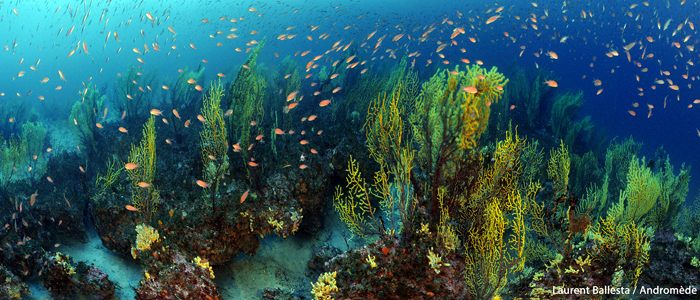LabCom Air to Sea
Approximately 60% of the world’s population lives within 100 km of the coast today, and 75% will in 2050, leading to considerable pressure of human activities on coastal marine ecosystems, recognized as the richest and most sensitive of the oceans. However, seabeds remain very poorly understood, and both their characterization and health monitoring generally require direct access and scuba diving. The hostility of the marine environment severely limits this work and the quantity of data collected.
The purpose of this collaborative project is to develop innovative tools that support decision making by improving surveillance and diagnosis of the coastal seabed environmentin situ, in the context of the continuing evolution of European and national regulations for coastal zone management.
ThisLabComwill combine the field experience and skills ofAndromède Océanologie, a company with expertise in coastal oceanography databases, and the scientific qualities of the BioDICee research team, recognized in the study of ecosystems and communities at theInstitute of Evolutionary Sciences of Montpellier(ISEM).
Andromède Océanologieis a commercial enterprise (SME) that has specialized for many years inin situecological surveys by scuba diving or by boat. Its sophisticated technologies and expertise in high-tech diving are unique in France, and rare in Europe. The company constantly develops innovative tools to propose new products to its customers and better differentiate itself from competitors, in France and in many other countries.
BioDICee researchers have broad experience in monitoring the impact of global change on the environment and in developing ecological indicators, in particular for coastal ecosystems using Posidonia seagrass in the Mediterranean see and coral reefs in the tropical zone.
BioDICee andAndromèdehave worked together since 2012 and thisLabComis a unique opportunity to prolong their partnership through the development of innovative tools to automate surveillance and environmental diagnosis of the coastal seabed. These tools relate firstly to automated data collection systems to reduce the human effort in diving, and other methods of data analysis to produce indicators of the health and status of marine ecosystems.
TheLabCom AIR TO SEAwill meet a strong demand for tools to understand the benthic communities of Posidonia seagrass and coralligenous beds in the Mediterranean. During the first 2 years, it will involve the automated identification and characterization of biotic communities at very fine (centimeter) scale. Development will then be extended to larger (decimeter) areas using automatic unmanned reconnaissance tools. Parallel to technological development, digital processing of the large quantities of data acquired will be developed and « industrialized ». Once developed, these tools can be tested on other coastal ecosystems, on natural or artificial habitats, in France and elsewhere.
At the end of 3 years, theAndromèdecompany will be able to market a full suite of new tools for the management of coastal marine habitats (from mapping to full diagnosis, integrating a range of ecosystem indicators) to support decision making. What we propose is therefore an integrated system for decision-making information, from field observations to a report or a management proposal for a client, which will represent a unique innovation in this field. The BioDICee research team will develop specific biota and underwater landscape ecological indicators, to enable integrated scientific approaches.
